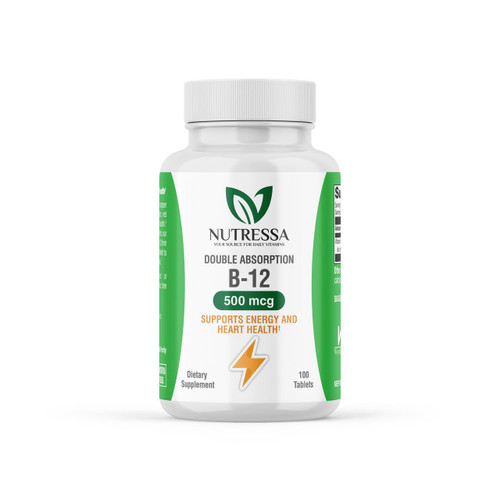Description
Nutressa's Vitamin D3 provides you with the highest quality Vitamin D in an easy-to-swallow soft gel capsule. Each dose contains the recommended daily value of 1,000 I.U., which works to reduce the risk of conditions associated with vitamin D deficiency. Get your daily dose of Vitamin D3 today!
- Quality Tested & Potency Verified
- Supports Overall Bone Health*
- Promotes Muscle Strength*
- Maintains Calcium Balance*
- Supports Health Of Teeth*
- Boosts Immune System*
- Regulates Blood Pressure*
Are you Vitamin D Deficient?
Sorry to say but based on statistics, you most likely are. According Scientific America(1) three-quarters of U.S. teens and adults are deficient in Vitamin D. While alarming, it really isn't surprising. While our bodies naturally produce the necessary Vitamin D we need, this only happens when our skin is exposed to enough sunlight, and even then, only under the right conditions. To make matters worse, the right sunlight is also dependent upon other factors including season, geographic latitude, time of day, cloud cover, and sunscreen. Finding that ideal situation is difficult and not practical, which is why so many people are Vitamin D deficient today.
Studies have also shown that as we age, we tend to produce less vitamin D even with adequate sun exposure. Older Americans (greater than age 50) are thought to have a higher risk of developing vitamin D deficiency. In addition, the kidneys, which help convert vitamin D to its active form, sometimes do not work (as we age) and even the ability of our skin to convert vitamin D into its active form decreases as we get older. These are the primary reasons why many adults must monitor their diets to make sure they are taking in enough vitamin D.
It is equally important for those individuals with limited sun exposure to include good sources of vitamin D in their diets. Homebound individuals, people living in northern latitudes such as in New England and Alaska, and individuals working in occupations that prevent exposure to sunlight are at risk of a vitamin D deficiency. If these individuals are unable to meet their daily dietary need for vitamin D, they may need a supplement of vitamin D.
Understanding the Vitamin D Benefits
Vitamin D is an important part of a healthy diet. New benefits of this vitamin are being discovered every day, but many people still do not receive enough vitamin D to reap the benefits it can provide to their health nor do they understand its vast benefits. It is important to first recognize what Vitamin D helps with and how. Vitamin D helps the body control phosphate and calcium levels. Therefore, it's no wonder Vitamin D is linked to promoting healthy bones and muscle strength since calcium absorption is so vital. In addition, Vitamin D has been known to regulate blood pressure, boost your immune system, support healthy teeth, and more. It has been shown that people who take in enough vitamin D are less likely to suffer from osteomalacia, rickets, osteoporosis and joint pain. This vitamin can also slow the effects of arthritis and lessen back pain in many individuals.
According to WebMD, the following studies highlight the importance of Vitamin D3:
- "At Boston University, after people with high blood pressure were exposed to UVA and UVB rays for three months, their vitamin D levels increased by more than 100% -- and more impressively, their high blood pressure normalized.
- "We've followed them now for nine months, and their hypertension continues to be in remission," says Holick, professor of medicine, physiology and biophysics at Boston University. One theory about how vitamin D reduces blood pressure: It decreases the production of a hormone called renin, which is believed to play a role in hypertension." (2)
- "In a study published in the Journal of the American Medical Association in December 2003, of more than 3,000 veterans (ages 50 to 75) at 13 Veterans Affairs medical centers, those who consumed more than 645 IU of vitamin D a day along with more than 4 grams per day of cereal fiber had a 40% reduction in their risk of developing precancerous colon polyps." (3)
- "In a report in the Journal of the American Geriatrics Society in February 2004, researchers at the University of Basel in Switzerland showed that elderly women who took a vitamin D supplement plus calcium for three months reduced their risk of falling by 49% compared with consuming calcium alone. Those women who had fallen repeatedly in the past seemed to gain the most benefit from vitamin D." (4)
- "A study in the Jan. 13, 2004 issue of Neurology indicated that women who get doses of vitamin D that are typically found in daily multivitamin supplements -- of at least 400 international units -- are 40% less likely to develop multiple sclerosis compared with those not taking over-the-counter supplements." (5)












